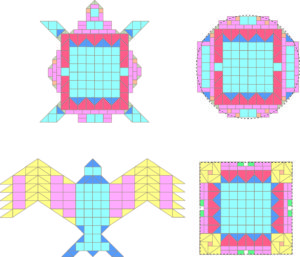FIRE ALTARS OF THE VEDAS – A LOGICAL PUZZLE FROM ANCIENT INDIA
 “3D Thinking” Pages 67 to 72: Vedic Fire Altars present a logical puzzle for those building them. Firstly, the surface area has to be in direct proportion to the height of the individual whose task it is to construct the altar. Secondly, there is to be a precise alignment of the altar with the four points of the compass using a standing stone (a gnomen) and observing the direction of the shortest shadow of each day – which points due North – the fire altar is to point due East. Thirdly, fire altars are to be constructed in five layers with alternating arrangements each of no more than 200 bricks – where the bricks are in whole number fractions and multiples of 1/16 of a unit: 2/16; 4/16; 5/16; 6/16; 8/16; 10/16; 12/16; 16/16; 20/16; 24/16 – and the surface area of each layer is to be 7.5 square Purushas which is 120 square units. The height of the person building the fire altar from the middle of the forehead to the soles of the feet is to be measured as 96 Angulas – and with hands stretched high, from the soles of the feet to the tips of the outstretched fingers, 120 Angulas, which is equal to 1 Purusha.
“3D Thinking” Pages 67 to 72: Vedic Fire Altars present a logical puzzle for those building them. Firstly, the surface area has to be in direct proportion to the height of the individual whose task it is to construct the altar. Secondly, there is to be a precise alignment of the altar with the four points of the compass using a standing stone (a gnomen) and observing the direction of the shortest shadow of each day – which points due North – the fire altar is to point due East. Thirdly, fire altars are to be constructed in five layers with alternating arrangements each of no more than 200 bricks – where the bricks are in whole number fractions and multiples of 1/16 of a unit: 2/16; 4/16; 5/16; 6/16; 8/16; 10/16; 12/16; 16/16; 20/16; 24/16 – and the surface area of each layer is to be 7.5 square Purushas which is 120 square units. The height of the person building the fire altar from the middle of the forehead to the soles of the feet is to be measured as 96 Angulas – and with hands stretched high, from the soles of the feet to the tips of the outstretched fingers, 120 Angulas, which is equal to 1 Purusha.
In the Vedas it is stated: ‘He who desires heaven is to construct a fire altar in the form of a falcon. A fire altar in the form of a tortoise is to be constructed by one desiring to win the Hindu world of Brahman’ [the Hindu creative principle underlying the world]. There are traditions associated with each shape chosen – chariot wheel, Alaja Bird, Trough, circle, square, isosceles triangle, rhombus, etc.
Each of the fire altar arrangements shown has an area of 120 square units. When ‘squaring the circle’ Vedic approximations for Pi were close to 3.14. Concepts of “Squaring the Circle” may well have come down to us through the generations from Vedic traditions of building fire altars – beginning almost, 4,000 year ago within the Harappan, Indus Valley, culture, firstly by word of mouth and then later in the form of Sanskrit, and then through ancient Egypt, the Pythagoreans and Euclid…
